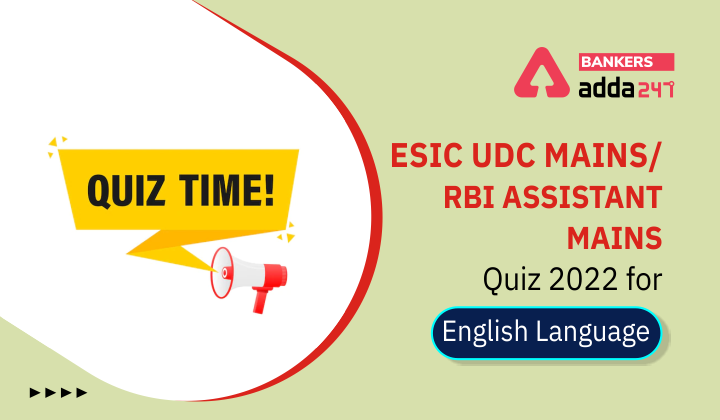Directions (1-15): A word has been given in each question and has been used in the sentences given below. Identify the statements where the word has been used in a contextually and grammatically correct manner.
Q1. ANECDOTE
(i) Their grandmother had an anecdote for every one of her children and grandchildren.
(ii) Although it was entertaining, the anecdote about Hazel that was floating around school was simply untrue.
(iii) The world has never been the same since the anecdote of the light bulb.
(a) both (ii) & (iii)
(b) only (iii)
(c) both (ii) & (i)
(d) only (ii)
(e) All of these
Q2. VIRTUE
(i) An attractive person without virtue does not deserve admiration.
(ii) He had the guts to tell his parents about his virtue to Columbia but decided against it.
(iii) Her virtue to leave her house resulted in her missing the train.
(a) only (i)
(b) both (i) & (iii)
(c) both (ii) & (iii)
(d) only (iii)
(e) All of these
Q3. COGNITIVE
(i) The cognitive test featured a series of questions that centre on reasoning and problem-solving.
(ii) Brain games are a fun way to keep the cognitive juices flowing.
(iii) Highly cognitive, the young boy showed an advanced level of intelligence.
(a) only (ii)
(b) only (ii)
(c) both (iii) & (ii)
(d) both (i) & (iii)
(e) All of these
Q4. OBSTINATE
(i) Many candies use obstinate flavours to make them taste fruity.
(ii) Obstinate policy is how the government uses money to influence the economy.
(iii) The scientist had an obstinate view when it came to embracing new methods.
(a) both (ii) & (i)
(b) only (iii)
(c) only (i)
(d) both (iii) & (ii)
(e) All of these
Q5. PERMEATE
(i) My uncle’s cigarette smoke is starting to permeate my furniture and make my entire house smell bad.
(ii) The shaman attempted to permeate a demon.
(iii) The office politics that permeate my workplace often prevent projects from being completed on time.
(a) both (i) & (iii)
(b) only (iii)
(c) only (ii)
(d) only (i)
(e) All of these
Q6. VITRIOLIC
(i) We are looking for vitriolic ways to approach the project.
(ii) He launched a vitriolic attack on the prime minister, accusing him of shielding corrupt friends.
(iii) The Chinese people have performed great vitriolic feats.
(a) only (i)
(b) only (iii)
(c) only (ii)
(d) both (ii) & (iii)
(e) All of these
Q7. DESPONDENT
(i) Many people were left homeless and despondent after a tornado swept through their state.
(ii) That despondent silverware must be worth thousands of dollars!
(iii) Whenever I feel despondent, I call my friends to make me smile.
(a) both (ii) & (iii)
(b) only (i)
(c) both (ii) & (i)
(d) both (i) & (iii)
(e) All of these
Q8. CONSTRUE
(i) We were all amazed by the detective’s ability to construe logic out of the killer’s strange riddle.
(ii) Some people may construe Alan’s constant frown as a sign he is displeased about life in general.
(iii) Even though Ellen looked at the handwritten note several times, she was unable to construe the message behind Henry’s messy text.
(a) only (ii)
(b) only (i)
(c) only (iii)
(d) both (ii) & (i)
(e) All of these
Q9. COMPLACENT
(i) Rice makes an excellent complacent to a curry dish.
(ii) The voters are too complacent to change the government.
(iii) Our team lost because some players became complacent.
(a) only (iii)
(b) only (i)
(c) both (iii) & (ii)
(d) both (ii) & (i)
(e) All of these
Q10. COLLOQUIAL
(i) The colloquial cabin needed a new roof and an exterminator.
(ii) The author makes use of colloquial speech to highlight the differences in upbringing between the novel’s hero and heroine.
(iii) Since I am from a different country, I have a difficult time understanding the colloquial language in this country.
(a) both (iii) & (i)
(b) both (ii) & (iii)
(c) only (ii)
(d) both (i) & (ii)
(e) All of these
Solutions
S1. Ans. (c)
Sol. Among the given sentences, anecdote has been used correctly in statements (ii) and (i).
Hence, option (c) is the most suitable answer choice.
ANECDOTE: a short amusing or interesting story about a real incident or person.
S2. Ans. (a)
Sol. Among the given sentences, virtue has been used correctly only in statements (i).
Hence, option (a) is the most suitable answer choice.
VIRTUE: a good moral quality in a person, or the general quality of goodness in a person.
S3. Ans. (e)
Sol. Among the given sentences, cognitive has been used correctly in all the statements.
Hence, option (e) is the most suitable answer choice.
COGNITIVE: involving intellectual activities such as reasoning and thinking.
S4. Ans. (b)
Sol. Among the given sentences, obstinate has been used correctly only in statements (iii).
Hence, option (b) is the most suitable answer choice.
OBSTINATE: relating to having a stubborn, headstrong attitude or opinion.
S5. Ans. (a)
Sol. Among the given sentences, permeate has been used correctly in statements (i) and (iii).
Hence, option (a) is the most suitable answer choice.
PERMEATE: to spread through something and be present in every part of it.
S6. Ans. (c)
Sol. Among the given sentences, vitriolic has been used correctly only in statement (ii).
Hence, option (c) is the most suitable answer choice.
VITRIOLIC: harsh or corrosive in tone; filled with bitter criticism or malice.
S7. Ans. (d)
Sol. Among the given sentences, despondent has been used correctly in statements (i) and (iii).
Hence, option (d) is the most suitable answer choice.
DESPONDENT: in low spirits from loss of hope or courage.
S8. Ans. (e)
Sol. Among the given sentences, construe has been used correctly in all the statements.
Hence, option (e) is the most suitable answer choice.
CONSTRUE: interpret (a word or action) in a particular way.
S9. Ans. (c)
Sol. Among the given sentences, complacent has been used correctly in statements (iii) and (ii).
Hence, option (c) is the most suitable answer choice.
COMPLACENT: satisfied with the current situation and unconcerned with changing it, often to the point of smugness.
S10. Ans. (b)
Sol. Among the given sentences, colloquial has been used correctly in statements (ii) and (iii).
Hence, option (b) is the most suitable answer choice.
COLLOQUIAL: (of language) used in ordinary or familiar conversation; not formal or literary.





 GA Capsule for SBI Clerk Mains 2025, Dow...
GA Capsule for SBI Clerk Mains 2025, Dow...
 The Hindu Review October 2022: Download ...
The Hindu Review October 2022: Download ...
 IBPS Clerk Mains Cut Off 2025, Check Sta...
IBPS Clerk Mains Cut Off 2025, Check Sta...







